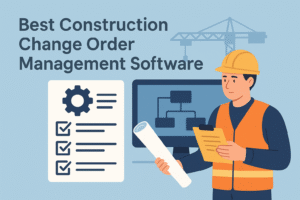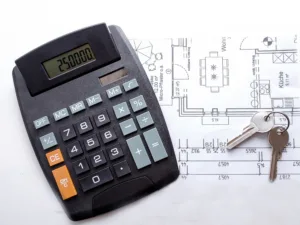There’s something thrilling about breaking new ground, both literally and figuratively, in the world of construction. From erecting towering skyscrapers that scratch the sky to constructing cozy homes that harbor countless memories, the construction industry is one that is as challenging as it is rewarding. Yet, with all its opportunities, it’s a field fraught with potential pitfalls for those not adequately prepared. If you’re considering stepping into the arena and starting a construction company, it’s crucial to navigate carefully to avoid common mistakes.
It’s no secret that the construction sector is a significant contributor to the economy, employing millions of people worldwide. However, the harsh reality is that many construction startups face turbulent times within the first few years. Why? Because they often overlook key aspects of running a construction business, from misunderstanding their market to failing to meet legal obligations. But don’t be discouraged – by learning from the errors of others, you can arm yourself with the knowledge to make your construction venture a success.
In this article, we’ll journey together, brick by brick, laying the foundation for your business by highlighting common mistakes to avoid. By being aware of these pitfalls and knowing how to steer clear of them, you can increase your chances of building a profitable and sustainable construction company. So, grab your hard hat, and let’s get started – the future skyline of your success is waiting to be drawn!
Table of Contents
1. Failing to Conduct Market Research
The construction industry, like any other, is all about supply and demand. And to be able to strike a balance, one must first understand the dynamics of the market. Unfortunately, many enthusiastic business founders dive headfirst into the pool of entrepreneurship without first testing the waters. This is like trying to build a house without a blueprint – it’s possible, but it’s far from efficient, and the results could be disastrous.
Market research might seem like a corporate buzzword, but it is the bedrock of any successful business. It is your guiding compass, providing direction on where to go, what to build, and whom to serve. The absence of market research often leads to misguided decisions, wasted resources, and disappointing outcomes.
A common mistake is assuming that because there’s a demand for construction, there’s a demand for every type of construction. The construction industry is vast, and its sectors are as diverse as the buildings it constructs. Each sector, be it residential, commercial, or industrial, has its own unique demands, opportunities, and challenges. Misreading these subtleties is a pitfall you don’t want to stumble into.
So, how can you conduct effective market research? Begin by understanding your potential clients. Who are they? What are their needs? What type of construction projects are they looking for? Remember, a successful construction company is built not just on bricks and mortar, but on understanding and meeting client needs.
Next, analyze your competitors. Who are the other players in your target market? What are they doing right, and where are they falling short? You can learn a lot from the triumphs and trials of others, so don’t shy away from studying your competition.
Lastly, stay up to date with industry trends and forecasts. The construction industry isn’t static – it shifts with the changing tides of technology, regulations, and consumer preferences. By keeping your finger on the pulse, you can anticipate changes and adapt accordingly, staying one step ahead of the competition.
In essence, effective market research is about asking the right questions, seeking the answers, and then using these insights to guide your business decisions. It’s about creating a roadmap that leads to success. After all, the more you understand your market, the better you can serve it, and the more likely your construction company is to thrive.
2. Underestimating Startup Costs
There’s an old saying that goes, “You have to spend money to make money,” and nowhere is this more accurate than in the construction industry. Starting a construction company requires a significant financial investment. You’ll need to purchase or lease heavy equipment, secure a physical location, hire and train employees, buy insurance, and that’s just scratching the surface. Regrettably, many startups falter, not because they lacked vision or skills, but simply because they underestimated the startup costs involved.
The allure of owning a construction business often blinds aspiring entrepreneurs to the reality of how expensive this venture can be. They envision the profits without accounting for the capital required to reach profitability. The consequences of such financial miscalculations are severe – they can lead to cash flow issues, stunted growth, and even bankruptcy.
Estimating startup costs accurately, therefore, is not just necessary but vital for your business survival. But how do you ensure that your cost estimates are on point?
Firstly, break down your costs into detail. Broad categories can mask hidden expenses, so it’s advisable to be as detailed as possible. Think about every stage of your operation and identify the costs involved.
Secondly, always anticipate and account for unexpected costs. The nature of the construction industry is such that unforeseen expenses are par for the course. Equipment could breakdown, projects could run over schedule, or prices of materials could skyrocket. Having a buffer in your budget for such unexpected expenses can be the difference between staying afloat or sinking.
Finally, seek professional advice. Consult with financial advisors or entrepreneurs in the construction industry who have walked this path before. Their insights can be invaluable in helping you navigate the financial landscape of starting a construction business.
Remember, capital is the lifeblood of your business. Without an accurate estimate of your startup costs, you’re setting off on a journey without knowing how much fuel you have in your tank. Don’t let your dreams crumble due to financial oversight. Plan your finances meticulously, and you’ll be well on your way to erecting a successful construction company.
3. Neglecting Proper Licensing and Legal Requirements
Now, let’s discuss a topic that isn’t exactly the most exciting, but is absolutely essential – legal compliance. The construction industry is one of the most regulated sectors, and with good reason. You’re dealing with people’s homes, workplaces, and community infrastructures. The work you do can significantly impact lives, so it’s imperative that your business adheres to all legal and industry standards.
However, some aspiring construction company owners underestimate the importance of these legal aspects or find the process daunting. The result? They might skip a few steps or fail to keep up with changing regulations. This oversight can lead to fines, legal disputes, project shutdowns, or worse, damage to your company’s reputation.
So, how can you ensure that your company meets all the necessary legal requirements?
First, understand that each state or country has its own set of construction laws and regulations. These can cover a wide range of topics, including safety standards, environmental impact, building codes, labor laws, and so on. Make it your business to know these laws like the back of your hand.
Second, never operate without the necessary licenses and permits. Not only is this illegal, but it also puts your company at a significant risk. Ensure that you have all the required certifications for your business and for the specific types of construction projects you undertake.
Third, make sure you have the right insurance coverages in place. Construction comes with a variety of risks, and accidents can happen even with the best safety protocols. Having the right insurance can protect your business from devastating financial losses.
Finally, when in doubt, consult with a legal expert. Construction law can be complex, and having a lawyer who specializes in this field can be an invaluable resource. They can guide you through the legal maze and help you stay on the right side of the law.
In summary, overlooking legal requirements when starting a construction company is a mistake you simply cannot afford. It might seem like a cumbersome process, but it’s a crucial part of building a solid, reputable, and legally compliant business. Keep your company on firm legal ground, and you’ll create a foundation that can weather any storm.
4. Ignoring Safety Protocols
Within the walls of a finished structure, it’s easy to overlook the risks that were undertaken during its construction. Beams of steel and stacks of concrete come together to form structures of safety and comfort. However, the process of constructing these buildings can be fraught with danger. This is why safety protocols in the construction industry aren’t just guidelines—they’re lifesavers.
Yet, some startups, in a bid to cut corners or accelerate completion timelines, may choose to ignore or downplay these safety protocols. This is a gamble that can lead to disastrous consequences, including injuries, fatalities, lawsuits, and irreversible damage to the company’s reputation.
The phrase “Safety First” isn’t just a catchy slogan—it’s the golden rule of construction. Your first job as a construction company owner isn’t to build structures—it’s to ensure the safety of your workers who build these structures.
So how do you ensure that safety isn’t compromised in your company?
Firstly, develop a comprehensive safety program. This program should detail the safety procedures and protocols for each type of job and equipment your employees will handle. It should be specific, clear, and accessible to everyone in the company.
Secondly, invest in safety training. A safety program is only as good as the people who implement it. Regular training sessions can ensure that each member of your team understands and adheres to safety protocols.
Next, equip your team with the right safety gear. Hard hats, safety glasses, high visibility clothing, protective footwear—these aren’t optional. Make sure your workers have and use the proper equipment to keep them safe on the job.
Lastly, create a culture of safety. From the top management down to the site workers, everyone should understand the importance of safety. Encourage employees to speak up about safety concerns, and always prioritize their well-being above project deadlines or budgets.
In conclusion, ignoring safety protocols is a dangerous and costly mistake when starting a construction company. It’s an area where cutting corners can quite literally be a matter of life and death. Make safety a priority from the get-go, and you’ll not only be protecting your employees but also building a reputation as a responsible and trustworthy company.
5. Poorly Defined Business Structure and Strategy
Just like a well-constructed building requires a solid blueprint, a successful construction company needs a clear business structure and strategy. However, in the enthusiasm of starting a new venture, some entrepreneurs neglect to define these crucial aspects. The result is often a business that’s as unstable as a building without a solid foundation.
Having a well-defined business structure and strategy is like having a roadmap and compass for your company. It guides your decisions, informs your operations, and steers your company in the right direction. Without these, you run the risk of wasting resources, making inconsistent decisions, and ultimately, failing to achieve your business goals.
So, how can you avoid these mistakes and establish a clear business structure and strategy?
Firstly, decide on the right business structure. Will your company be a sole proprietorship, a partnership, or a corporation? Each structure has its own implications for liability, taxes, and management. Choose the one that best suits your business model and growth plans.
Next, develop a detailed business plan. This document should outline your company’s mission, target market, unique selling proposition, marketing strategy, organizational structure, and financial projections. A well-written business plan not only guides your operations but also helps attract investors and lenders.
After that, outline your operational procedures. These include your procurement processes, project management methods, quality control measures, and safety protocols. Clear operational procedures ensure consistency in your service delivery and help boost productivity and efficiency.
Finally, don’t forget about your growth strategy. How will your company achieve its financial goals? Will you focus on a specific market niche? Will you offer a broad range of services or specialize in a few? Planning your growth strategy in advance helps you make proactive business decisions and stay ahead of the competition.
In summary, neglecting to define your business structure and strategy is a pitfall you want to avoid when starting a construction company. It might seem like a tedious task, but it’s an investment that can save you a lot of trouble down the road. Remember, a building is only as strong as its blueprint. So too, a construction company is only as successful as its business plan.
6. Underestimating the Importance of Marketing
In the grand scheme of constructing a successful business, marketing is sometimes viewed as an optional extra rather than a vital component. Many new construction company owners are so engrossed in the operational side of the business that they neglect to give marketing the attention it deserves. This can be a costly mistake. Regardless of how skilled you are or how top-notch your services might be, without effective marketing, your potential clients may never find out about your business.
Contrary to some misconceptions, marketing in the construction industry isn’t just about flashy ads or catchy slogans. It’s about communicating your company’s value proposition to your target audience, building relationships with potential clients, and setting your business apart in a highly competitive industry.
So, how can you avoid the mistake of underestimating marketing?
Firstly, create a marketing plan. This should align with your overall business strategy and include clear objectives, a target audience profile, a detailed competitor analysis, and a mix of marketing strategies to reach your audience effectively.
Secondly, understand that marketing is more than just promotion. It encompasses everything from market research and service development to client service and after-sales support. Each of these elements plays a crucial role in shaping your clients’ perception of your business and must be thoughtfully managed.
Next, invest in branding. Your brand is more than just your company name or logo—it’s what people think and feel when they hear your company name. A strong brand can help you command higher prices, attract better clients, and build customer loyalty.
Finally, leverage digital marketing. In today’s digital age, a company website and a strong online presence aren’t luxuries—they’re necessities. Utilize search engine optimization (SEO), social media marketing, and online advertising to increase your visibility and reach more potential clients.
In conclusion, underestimating the importance of marketing is a trap you don’t want to fall into when starting a construction company. Remember, it doesn’t matter how good your services are if no one knows about them. Invest time, effort, and resources into effective marketing, and watch as your company grows from a startup into a formidable player in the construction industry.
7. Hiring the Wrong Team
Building a successful construction company is a collective effort. It’s not just about the founder’s vision or the amount of capital invested—it’s also about the people who turn that vision into reality. The importance of hiring the right team, therefore, cannot be overstated. Yet, some entrepreneurs make the mistake of rushing through the hiring process or failing to consider the skills and values their team needs to embody.
Hiring the wrong team can lead to a host of problems, from low-quality work and missed deadlines to unhappy clients and a toxic work culture. Your team is the backbone of your company. They represent your business on the frontline, making the difference between a one-time client and a repeat customer.
So, how can you avoid hiring mistakes and build a team that will help your construction company thrive?
Firstly, define your company culture and values. What principles guide your operations? What attributes do you want your team to embody? By establishing your company culture from the get-go, you can attract like-minded individuals who will contribute positively to your business.
Next, prioritize skills and experience. While it might be tempting to hire less experienced workers to save on labor costs, remember that quality workmanship is paramount in the construction industry. Prioritize hiring experienced professionals who can deliver the high standard of work your clients expect.
Then, invest in employee training and development. Even the best professionals need to update their skills to stay relevant in the fast-evolving construction industry. By investing in ongoing training, you not only improve your team’s skills but also show them that you value their growth.
Lastly, don’t forget about soft skills. Attributes such as communication, problem-solving, and teamwork are critical in a collaborative industry like construction. Look for candidates who not only excel in their roles but also know how to work effectively within a team.
In conclusion, hiring the wrong team is a common mistake to avoid when starting a construction company. Remember, your employees are the face of your company. They have a direct impact on your work quality, client satisfaction, and overall business reputation. Therefore, take the time to hire wisely, and build a team that can turn your business vision into a successful reality.
8. Ignoring Customer Service
The construction industry might be all about bricks, steel, and concrete, but at its core, it’s a service industry. You’re not just selling a product; you’re providing a service to your clients. Regrettably, some new construction business owners, caught up in the tangible aspects of the business, overlook the importance of good customer service. This is a critical mistake that can cost your company its reputation and future growth.
Customer service in the construction industry goes beyond being polite or responsive. It’s about delivering on your promises, respecting your clients’ time and budget, addressing their concerns promptly, and exceeding their expectations at every turn.
So, how can you ensure that your construction company excels at customer service?
Firstly, foster a customer-centric culture in your company. From the management down to the site workers, everyone should understand that the customer’s satisfaction is paramount. This attitude should be reflected in your company values, operational processes, and employee training programs.
Next, communicate proactively with your clients. Keep them informed about the progress of their projects, potential delays, or any changes that may affect them. Regular and honest communication can help build trust and prevent misunderstandings.
Additionally, ask for feedback and take it seriously. After each project, ask your clients about their experience. What did they like? What could be improved? Use this feedback to continuously refine your services and ensure you’re meeting your clients’ needs.
Finally, remember that good customer service doesn’t end when the project is completed. Offer after-sales support to handle any post-construction issues that may arise. This not only helps your clients but also shows them that you stand by your work even after the job is done.
In summary, ignoring customer service is a mistake you can’t afford to make when starting a construction company. A happy client is your best advertisement and can bring in more business through positive word-of-mouth. Invest in excellent customer service, and your clients will reward you with their loyalty and referrals.
9. Not Preparing for Unexpected Costs
Construction is a business where the unexpected is the norm. Project delays, equipment breakdowns, material cost fluctuations, weather disturbances, accidents – these are just some of the unplanned issues that can crop up, often bringing unexpected costs. Some new construction business owners, however, underestimate these contingencies, setting their budgets with little to no room for unplanned expenses. This can lead to financial strain, stalled projects, and dissatisfied clients.
Failing to plan for unexpected costs doesn’t just jeopardize your current projects—it can threaten the very survival of your new business. Therefore, it’s vital to acknowledge and prepare for the inevitability of these costs.
So, how do you protect your construction business from unexpected costs?
Firstly, always include a contingency fund in your budget. This is an amount set aside to cover unexpected costs that arise during construction. While it’s hard to predict the exact amount you’ll need, a general rule of thumb is to set aside 10-15% of the project cost.
Next, adopt proactive risk management practices. Regularly review your projects to identify potential risks and develop strategies to mitigate them. This proactive approach can help prevent some unexpected issues and reduce the costs when they do occur.
Also, consider investing in comprehensive insurance coverage. Insurance can cover a range of risks, from accidents and equipment damage to legal disputes and contract issues. While it does come at a cost, it can save your business from devastating financial losses.
Finally, maintain good relationships with your suppliers and subcontractors. When unexpected issues arise, having reliable partners can make a significant difference. They can help expedite orders, accommodate changes, or extend payment terms, helping you manage unexpected costs more effectively.
In conclusion, failing to prepare for unexpected costs is a dangerous mistake when starting a construction company. It’s vital to anticipate these costs and take proactive measures to manage them effectively. Remember, in the unpredictable world of construction, the best defense is a good offense. Plan wisely, and you’ll equip your business to weather any storm.
10. Not Having a Solid Contract Management Process
Contracts are the lifeline of the construction industry. They define the rights, responsibilities, and expectations of all parties involved, from the owner and contractor to the subcontractors and suppliers. They detail the project scope, timeframe, budget, and procedures for dispute resolution. Despite the critical role of contracts, some new construction company owners overlook the importance of a solid contract management process. This oversight can lead to misunderstandings, disputes, delays, and even lawsuits.
Without a proper contract management process, you expose your business to unnecessary risk. You may end up agreeing to unfavorable terms, failing to comply with contractual obligations, or missing out on opportunities to optimize your operations.
So, how can you establish a solid contract management process in your construction company?
Firstly, always use written contracts. Verbal agreements are not only difficult to prove but also inadequate for capturing the complexity of construction projects. A written contract helps ensure that all parties are on the same page and provides a reference point in case of disputes.
Next, seek legal advice when drafting or signing contracts. Contract law can be complex, and the implications of contractual terms may not always be apparent to non-lawyers. A lawyer can help you understand the contract, negotiate better terms, and ensure it complies with applicable laws and regulations.
Also, assign a dedicated contract manager. This person will be responsible for overseeing the contract process, from negotiation and signing to execution and closure. They’ll ensure that all contractual obligations are met, changes are properly documented, and any issues are addressed promptly.
Finally, invest in contract management software. This tool can help you store, organize, track, and analyze your contracts more effectively. It can also send alerts for critical dates, like contract renewal or payment deadlines, preventing costly oversights.
In conclusion, not having a solid contract management process is a costly mistake when starting a construction company. Contracts are too important to be left to chance. By managing them effectively, you can protect your business interests, enhance your operational efficiency, and build stronger relationships with your clients, suppliers, and subcontractors.
Conclusion
Embarking on the journey to start a construction company can be exciting, challenging, and at times, overwhelming. Like any journey, there may be a few bumps and detours along the way. However, understanding common mistakes can help you navigate the road more confidently and improve your chances of reaching your destination successfully.
The pitfalls we’ve discussed—neglecting market research, underestimating start-up costs, poorly defining business structure and strategy, underestimating the importance of marketing, hiring the wrong team, ignoring customer service, not preparing for unexpected costs, not having a solid contract management process—are all common mistakes many new construction company owners make. By being aware of these, you can avoid falling into the same traps.
Remember, a successful construction company is not built in a day. It requires careful planning, disciplined execution, and ongoing learning and adaptation. Don’t be disheartened by the challenges you encounter. Instead, view them as opportunities to learn and grow.
Lastly, remember that the construction industry is ultimately about creating value—building structures that house businesses, shelter families, and serve communities. Keep this purpose at the forefront of your business, and you’re bound to build not just structures but a construction company that stands the test of time.
Thanks for reading, and here’s to your success in starting your own construction company! Feel free to share your experiences or questions in the comments below. We’d love to hear from you!
Related posts
Read our other articles where you can find useful and relevant information about how to start construction business:
- How to Start a Construction Company: 10 Steps to Start Your Own Business
- How to Increase Your Construction Company’s Profitability
- Enhancing Construction Efficiency: Key Factors and Strategies
- How to Manage Rising Costs in the Construction Industry?
- How to be a better construction project manager?
About the Author

Taavi Kaiv
Taavi Kaiv is a construction specialist with over ten years of experience in the construction industry. Taavi is an accomplished construction project manager with many successful projects that have been completed under his guidance. Taavi holds a master’s degree in construction management from the Tallinn University of Technology. View profile






